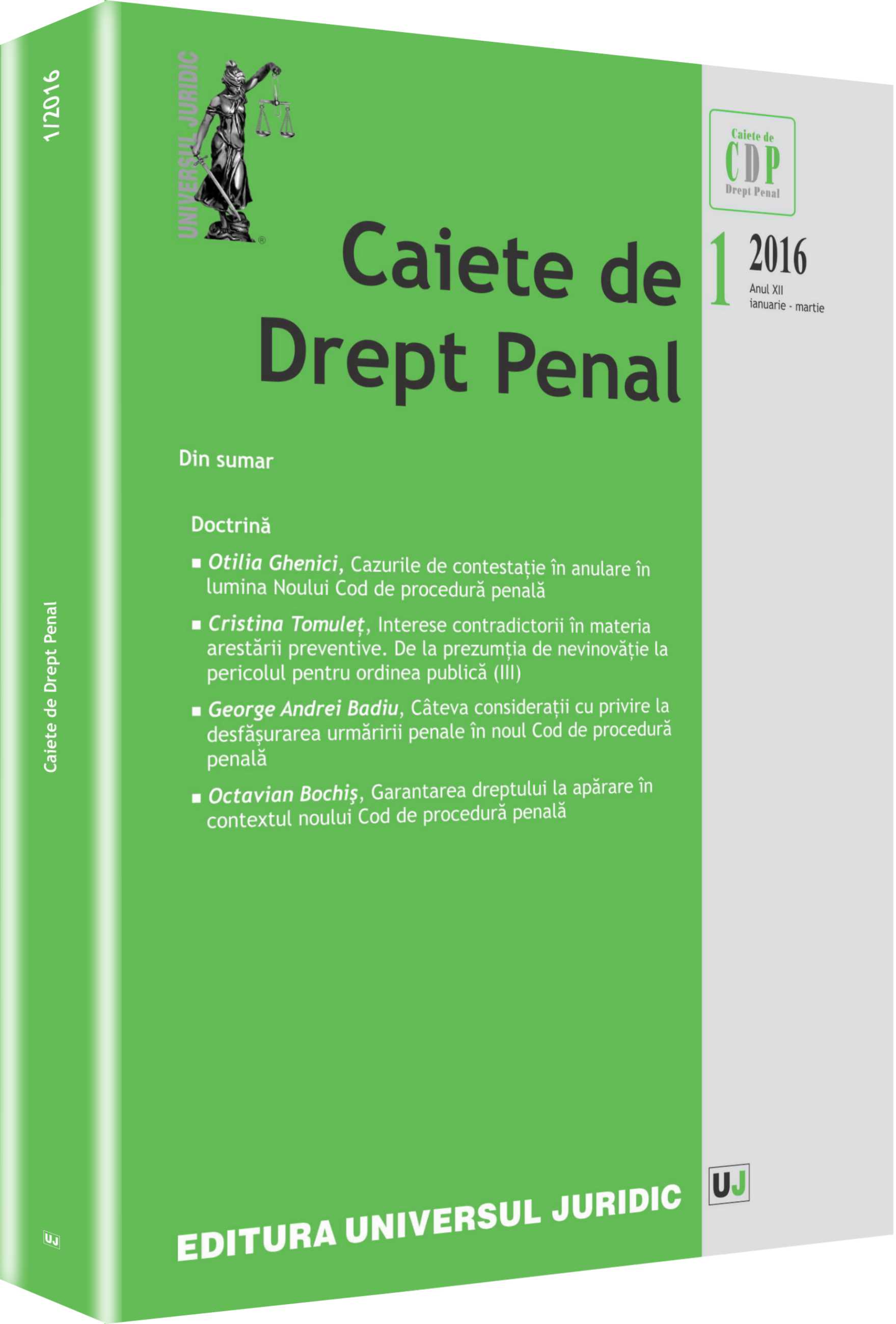Cazurile de contestaţie în anulare în lumina Noului Cod de procedură penală
The Grounds for the Challenge for Annulment in light of the new Code of Criminal Procedure
Author(s): Otilia GheniciSubject(s): Law, Constitution, Jurisprudence, Criminal Law
Published by: Universul Juridic
Keywords: challenge for annulment; legal grounds for the challenge for annulment; the former and the new Code of criminal procedure; similarities and differences; case law notes; critics;
Summary/Abstract: The challenge for annulment is not new to the Romanian legislation, as it was also regulated by the previous Code of Criminal Procedure in art. 386-392. In order to counter the lack of celerity of the criminal proceedings, the initiators of the New Code of Criminal Procedure explicitly intended to abandon the challenge for annulment as an extraordinary legal remedy, and regulate it among the ordinary legal remedies. Final criminal decisions could be disputed by means of a challenge for annulment, an ordinary legal remedy, in two situations: if the appeal court proceedings took place without lawful summoning of a party or if, although lawfully summoned, it was impossible for the party to be present and to notify the court of this impossibility (1), and if the defendant was convicted, even though there was evidence regarding the existence of a reason to end the criminal court proceedings (2). By Law no. 255/2013 for the application of the Code of Criminal Procedure, the legislator backtracked and regulated the challenge for annulment among the extraordinary legal remedies, expressly establishing nine reasons which can be invoked against a final criminal decision. Thus, whereas the former legislation provided a total number of 5 grounds for the challenge for annulment, currently there are 9 such grounds. As previously stated, the project for the Code of Criminal Procedure initially provided only 2 grounds for the challenge for annulment, but as a consequence of the changes brought by Law no. 255/2013, 6 of the grounds provided for the appeal to the Supreme Court under art. 438 of the Criminal Code of Procedure were removed and inserted in art. 426 of the Criminal Code of Procedure among the grounds for the challenge for annulment. In addition to these, one more reason for the challenge for annulment was regulated, a reason which was also covered by the previous legislation in art. 386 (d) of the Criminal Code of Procedure. In the explanatory note of Law no. 255/2013 it is explained that the reasons regarding procedural aspects were removed as reasons for the appeal to the Supreme Court and from the jurisdiction of the High Court of Cassation and Justice, and transformed into reasons for the challenge for annulment, according to the nature of this extraordinary legal remedy. We notice that the reasons for the challenge for annulment previously regulated by the former Code of Criminal Procedure were maintained with slight changes, and to these the legislator added the reasons for quashing previously provided by art. 3859 (1) pt. 3-6 of the Code of Criminal Procedure 1968 and subsequently regulated, prior to the changes brought by Law no. 255/2013, as reasons for the appeal to the Supreme Court in art. 438 pt. 3-6. Thus, the previous (solutions in) case law will continue to be valid, which is the reason why in the present article we shall present the reasons for the challenge for annulment by reference to the case law prior to the entry into force of the New Code of Criminal Procedure, as well as to the subsequent case law, which is currently emerging. In summary, final criminal decisions can be disputed by means of a challenge for annulment in the following cases: a) if the appeal court proceedings took place in the absence of the lawful summoning of a party or if, although lawfully summoned, it was impossible for the party to be present and to notify the court of this impossibility; b) if the defendant was convicted even though there was evidence regarding the existence of a reason to end the criminal court proceedings; c) if the ruling was delivered by a judicial panel different from the one that participated in the debates’ stage of the trial; d) if the court was not established according to the law or there was a case of incompatibility; e) if the court proceedings took place in the absence of the prosecutor or of the defendant, in the cases in which the presence was mandatory according to the law; f) if the court proceedings took place in the absence of the defence attorney, in the cases where legal assistance was mandatory according to the law; g) if the court hearing was not public, apart from the cases when the law provides otherwise; h) if the court did not proceed to hear the defendant who was present, if the hearing was possible according to the law; i) if there were two final decisions issued against a person for the same deed.
Journal: Caiete de drept penal
- Issue Year: XII/2016
- Issue No: 01
- Page Range: 11-71
- Page Count: 61
- Language: Romanian
- Content File-PDF

